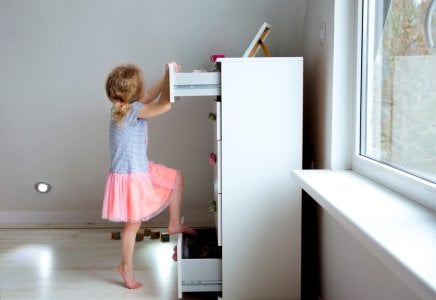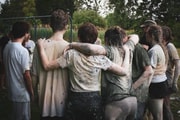ACCC introduces new laws to reduce toppling furniture dangers
By
Seia Ibanez
- Replies 39
The safety of our loved ones is paramount, and when it comes to the sanctity of our homes, we assume a level of security that, tragically, is not always guaranteed.
In light of this, the Australian Competition and Consumer Commission (ACCC) has taken a significant step to enhance the safety of furniture in our homes.
This comes after ACCC revealed that nearly 1,000 Australians are injured each year due to unstable furniture, with 28 deaths recorded over the past 24 years.
Heartbreakingly, 17 of these fatalities were children under the age of five.
In response to these figures, the ACCC has announced a new furniture standard to prevent further tragedies.
The new toppling furniture information standard, introduced by Assistant Treasurer Stephen Jones on 3 May, represents a ‘critical step towards reducing the injuries and deaths’, ACCC Deputy Chair Mick Keogh said.
The dangers of toppling furniture are severe, with head injuries, crush injuries, and suffocation being the leading causes of death.
The risk is particularly high for young children, who are naturally curious and often unaware of the potential dangers posed by heavy, unsecured items.
However, it's not just the little ones who are at risk; elderly Australians are also vulnerable to these hazards.
Under the new regulations, furniture suppliers are now required to take several measures to mitigate the risks associated with furniture toppling.
These include attaching a permanent warning label to furniture items, providing safety information and advice about anchoring furniture in manuals and assembly instructions, and issuing warnings about the hazards of toppling furniture in stores and online.
For businesses that fail to comply with these standards, they will pay the maximum penalty for breaching the standard set at $50 million.
It's important to note that the standard excludes second-hand and resold furniture, as well as furniture already designed to be fastened to the wall.
The ACCC advised the best way to prevent furniture from tipping over.
‘The best way to prevent furniture from tipping over is to secure it to the wall or floor,’ the ACCC said.
‘What you’ll need depends on what your wall or floor is made of and what kind of furniture you’re working with. There are different kinds of wall and floor anchors available.’
‘If your furniture doesn’t come with anchoring hardware, you can ask about anchors and buy what you need from a furniture retailer, hardware store or a speciality store for baby goods.’
Additional safety measures include storing heavy items in the bottom drawers to prevent furniture from becoming top-heavy and locking drawers to prevent children from using them as steps to climb.
Before purchasing new furniture, the ACCC recommended examining it in the store to ensure it is sturdy and stable.
 We would love to hear from you about the steps you're taking to secure furniture in your home or any experiences you've had with unstable furniture. Your insights could be invaluable to fellow readers and help prevent future accidents. Share your thoughts and tips in the comments below, and let's work together to keep our families safe.
We would love to hear from you about the steps you're taking to secure furniture in your home or any experiences you've had with unstable furniture. Your insights could be invaluable to fellow readers and help prevent future accidents. Share your thoughts and tips in the comments below, and let's work together to keep our families safe.
In light of this, the Australian Competition and Consumer Commission (ACCC) has taken a significant step to enhance the safety of furniture in our homes.
This comes after ACCC revealed that nearly 1,000 Australians are injured each year due to unstable furniture, with 28 deaths recorded over the past 24 years.
Heartbreakingly, 17 of these fatalities were children under the age of five.
In response to these figures, the ACCC has announced a new furniture standard to prevent further tragedies.
The new toppling furniture information standard, introduced by Assistant Treasurer Stephen Jones on 3 May, represents a ‘critical step towards reducing the injuries and deaths’, ACCC Deputy Chair Mick Keogh said.
The dangers of toppling furniture are severe, with head injuries, crush injuries, and suffocation being the leading causes of death.
The risk is particularly high for young children, who are naturally curious and often unaware of the potential dangers posed by heavy, unsecured items.
However, it's not just the little ones who are at risk; elderly Australians are also vulnerable to these hazards.
Under the new regulations, furniture suppliers are now required to take several measures to mitigate the risks associated with furniture toppling.
These include attaching a permanent warning label to furniture items, providing safety information and advice about anchoring furniture in manuals and assembly instructions, and issuing warnings about the hazards of toppling furniture in stores and online.
For businesses that fail to comply with these standards, they will pay the maximum penalty for breaching the standard set at $50 million.
It's important to note that the standard excludes second-hand and resold furniture, as well as furniture already designed to be fastened to the wall.
The ACCC advised the best way to prevent furniture from tipping over.
‘The best way to prevent furniture from tipping over is to secure it to the wall or floor,’ the ACCC said.
‘What you’ll need depends on what your wall or floor is made of and what kind of furniture you’re working with. There are different kinds of wall and floor anchors available.’
‘If your furniture doesn’t come with anchoring hardware, you can ask about anchors and buy what you need from a furniture retailer, hardware store or a speciality store for baby goods.’
Additional safety measures include storing heavy items in the bottom drawers to prevent furniture from becoming top-heavy and locking drawers to prevent children from using them as steps to climb.
Before purchasing new furniture, the ACCC recommended examining it in the store to ensure it is sturdy and stable.
Key Takeaways
- The ACCC has introduced a new furniture information standard after the deaths of 17 young children due to toppling furniture.
- Furniture suppliers are now required by law to include permanent warning labels, safety information, and advice on anchoring furniture.
- The new standard aims to reduce injuries and fatalities by making consumers aware of the risks and providing them with necessary safety measures.
- Consumers are advised to secure furniture to walls or floors and take other preventive measures, such as keeping heavy items in lower drawers.








